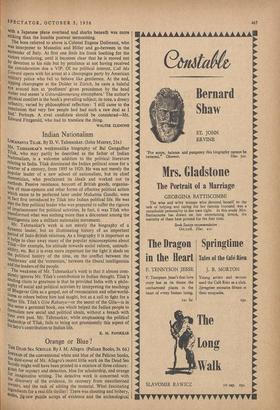Indian Nationalism
LOKAMANYA TILAIC. By D. V. Tahmankar. (John Murray, 21s.) TAHMANKAR'S workmanlike biography of Bal Gangadhar Tilak, who may partly be described as the father of Indian Nationalism, is a welcome addition to the political literature relating to India. Tilak dominated the Indian political scene for a quarter of a century, from 1895 to 1920, He was not merely the Popular leader of a new school of nationalism, but its chief theoretician, who proclaimed its ideals and worked out its Methods. Passive resistance, boycott of British goods, organisa- tion of mass-opinion and other forms of effective political action Which came to be perfected later under Mahatma Gandhi, were In fact first introduced by Tilak into Indian political life. He was also the first political leader who was prepared to suffer the rigours °f Imprisonment for political activities. In fact, it was Tilak who transformed what was nothing more than a discontent among the Intelligentsia into a militant nationalist movement. Mr. Tahmankar's work is not merely the biography of a dYnamic leader, but an illuminating history of an important Period of Indo-British relations. As a biography it is important as helps to clear away many of the popular misconceptions about ,ilak---for example, his attitude towards social reform, untouch- a"IlItY. etc. But it is even more important for the light it sheds on ,we political history of the time, on the conflict between the moderates' and the 'extremists,' between the liberal intelligentsia and the leaders of the people.
The weakness of Mr. Tahmankar's work is that it almost com- pletely ignores Mr. Tilak's contribution to Indian thought. Tilak's abiding claim to greatness is that he provided India with a philo- acIPhy of social and political activism by interpreting the teachings
Bhagavat Gita as a gospel, not of renunciation and otherworld- liness as others before him had taught, but as a call to fight for a better life. Tilak's Gita Rahasya—or the secret of the Gita—is in this sense a germinal book, one which helped the Indian people to formulate new social and political ideals, without a breach with their own past. Mr. Tahmankar, while emphasising the political I,Cadership of Tilak, fails to bring out prominently this aspect of 'la hero's contribution to Indian life.
K. M. PANLKKAR


















































 Previous page
Previous page